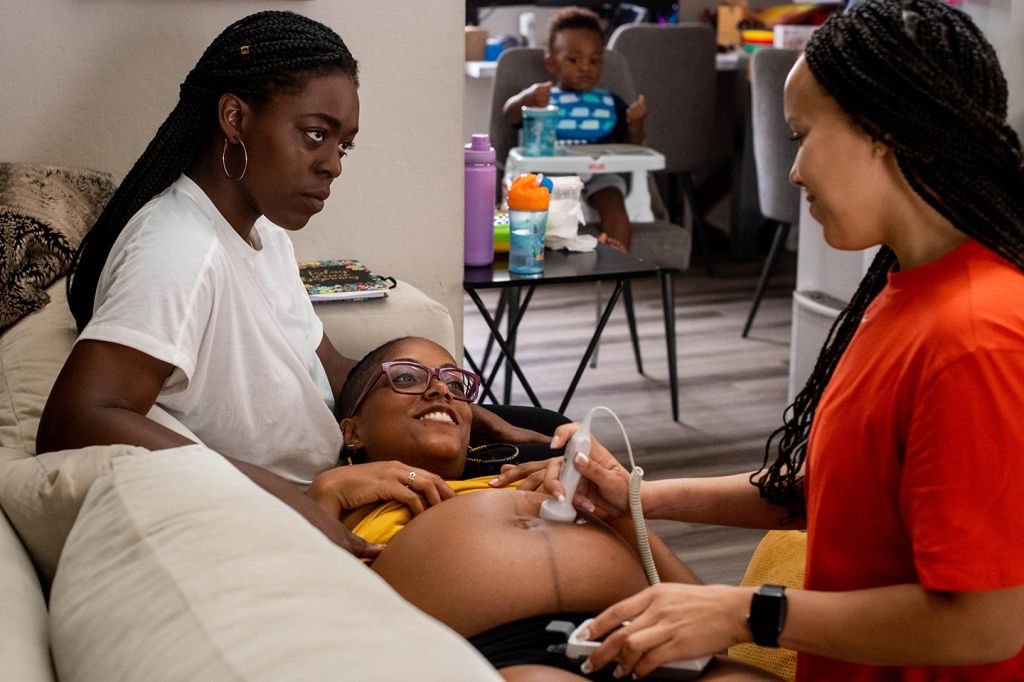Tufts University Launches Black Maternal Health Center
Source: MediaNews Group/Los Angeles Daily News via Getty Images / Getty
Black women are dying at an alarming rate during childbirth. Along with disparities in reproductive health and post-care, Black maternal health requires direct intervention beyond a week of action.
Last week, Tufts launched the Center for Black Maternal Health and Reproductive Justice, spearheaded by professor Ndidiamaka Amutah-Onukagha. Amutah Onukagha is the Julia A. Okoro Professor of Black Maternal Health at Tufts University School of Medicine.
“The country is in a crisis around maternal health. The majority of Black maternal deaths are completely preventable,” Amutah-Onukagha, dean of the university’s Department of Public Health and Community Medicine, said in a statement. “The vision of the center is to protect the Black birthing experience by advocating for quality, equitable, and respectful care in childbirth.”
According to the Centers for Disease Control and Prevention, African American mothers are three times more likely to die from pregnancy-related causes than White women. Several social factors are responsible for the glaring disparity, including structural racism, quality of healthcare, and underlying chronic conditions that often impact the community. Tufts University has recently launched a new initiative hoping to bring attention to the issue.
One factor that appears to be driving adverse Black maternal health outcomes is the extensive use of c-sections. According to Open Democracy, Black mothers are often pressured to undergo the procedure at a higher rate (35.9 percent) than white women (30.7 percent). While medical officials often recommend c-sections for women carrying twins or for those giving birth to children after their childbearing years, the delivery method can come with serious complications.
Mothers can experience damage to the bladder, infections, heart attack, or even severe hemorrhaging during the procedure. Excessive bleeding during a C-section is one of the leading causes of childbearing-related deaths. Uterine scarring can also develop, leading to severe pain, abnormal bleeding, and future surgeries to remove damaged tissue.
Some medical researchers have suggested that there may be more incentive to push pregnant moms toward undergoing a C-section to profit from hospital fees. The Value Penguin estimates that a pregnant individual could pay close to $22,646 for a C-section compared with $12,915 for a “normal” vaginal delivery.
Amutah-Onukagh announced the big news during the 5th annual Black Maternal Health Week celebration. Created by the Black Mamas Matter Alliance, the annual celebration brings awareness to Black birthing and reproductive issues while highlighting several activists and organizations working to protect, educate and empower Black mothers.
This year’s week of action, which took place from April 11 to April 17, featured a full list of activities for attendees, including meditation and maternal yoga, sexual intimacy and reproductive justice workshops and an extensive chat featuring members of Congress about the Black Maternal Health Momnibus Act.
The bill, introduced in August 2021, aims to improve maternal health, particularly among racial and ethnic minority groups, veterans, and other vulnerable populations. It also addresses maternal health issues related to COVID-19.
“The opportunity to create and launch a national Center for Black Maternal Health and Reproductive Justice at this critical time will not only honor the workaround maternal health equity but also position Tufts as a leader in this field,” Amutah-Onukagha said.
SEE ALSO:
Black Women-Led Organizations Launch Reproductive Justice Agenda On 49th Anniversary of Roe. v. Wade

